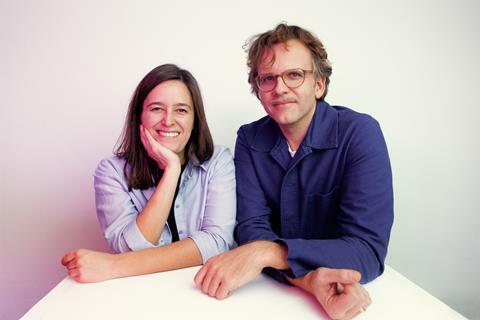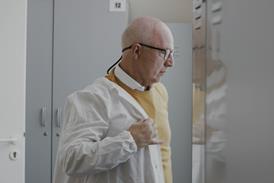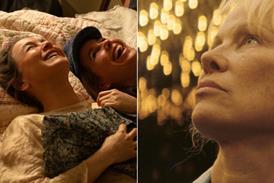
Opening with Natja Brunckhorst’s German reunification comedy Two To One, this year’s Munich International Film Festival (June 28 - July 7) is screening 150 films from 53 countries, with six world premieres and a further 56 international or European premieres.
The 41st edition of the festival will also present actors Jessica Lange and Kate Winslet with CineMerit Awards in recognition of their contributions to film as an art form; dedicate homages to Iranian director Sohrab Shahid Saless and Japan’s Shin’ya Tsukamoto; and, in a fifth cooperation with Museum Brandhorts, showcase a decade of queer club culture in New York with a programme entitled ‘Sparking and Wild: 80’s New York in Film’.
This year’s event is the first under incoming festival director Christoph Gröner (who makes the transition from artistic director) and artistic co-director Julia Weigl (who previously curated the festival’s international programme and before that worked in the press department).
In a conversation with Screen, they speak about their new roles, innovations at this year’s festival, dominant themes in the New German Cinema section and the issues being addressed in the industry events.
Christoph and Julia, what has the transition been like for you both in your new roles as festival director and co-artistic director?
Christoph Gröner: I’ve been working for the festival for 20 years, starting as an intern in 2004, and Julia has been here for the past 10 years, so there’s a great deal of experience of knowing what the festival is all about. Becoming the CEO means that you have new responsibilities, including getting our shareholders from the state of Bavaria and the city of Munich as enthused about cinema and our plans for the festival.
One of my first steps was to focus on the element of dialogue as being at the festival’s core and informing all of our strategic decisions. We are always thinking about contextualisation when preparing the programme, to see what more can be done apart from just showing the films. This is why we are constantly challenging the boundaries of what a film festival should be, and do this by working with partners.
Julia Weigl: We’ve expanded our network of partners in Munich quite considerably this year: the German Theatre Museum will be hosting a selection of CineMerit Award honouree Jessica Lange’s work as a photographer in an exhibition entitled ‘Through Her Lens’, the main hall of the Münchner Kammerspiele theatre will present the world premiere of the science fiction film Planet Magnon, and the Deutsches Theater will be the venue for the award ceremonies for Jessica Lange and Kate Winslet along with [screenings of] their films [The Great Lillian Hall and Lee respectively].
Christoph, has the administrative side of staging the festival taken you away from scouting films for the programme?
CG: Personally, I couldn’t head a festival without also being involved in the programming. But one of our first decisions was to expand the team of programmers and involve different voices and perspectives, including young filmmakers such as Mila Zhluktenko and Daniel Asadi Faezi who have both been exploring the realms of hybrid films between documentary and fiction.
Have there been any changes to the way in which the festival is being presented?
JW: Apart from reviving its official English name as the Munich International Film Festival, we are also bringing the festival catalogue back because we feel it’s right to provide our international guests with a documentation of the festival that they can then take home with them.
Which international filmmakers are you expecting at the festival and is there one person you are particularly looking forward to welcoming?
CG: There are the two CineMerit Award recipients Jessica Lange and Kate Winslet, and then there’s Viggo Mortensen with his second film as director The Dead Don’t Hurt, Isabelle Huppert with Sidone au Japon and Trine Dyrholm for the world premiere of Desiree Nosbusch’s Poison.
JW: I am also looking forward to a very talented up-and-coming filmmaker from the UK, Luna Carmoon, who’s coming to Munich with her film Hoard.
CG: And I also want to highlight Daniele Luchetti with his amazing body of work; we’ll be showing his latest film Trust which is a such a cerebral thriller of secretive thoughts and emotions
Which specific thematic or artistic trends have you identified in this year’s line-up for the New German Cinema section?
CG: What we see is that young German filmmakers are reacting in their films to the world we are living in — and, in many places, this is a world in upheaval.
JW: At the same time, I have seen a trend of what I would call the anti-Heimatfilm: several filmmakers are trying to leave their home and find themselves, which often leads them to having to confront all their issues and the reasons they are trying to escape. Sabbatical, Places In The Sun and All We Ever Wanted would be examples of such films. Furthermore, we wanted to showcase new and fresh voices alongside ‘old friends’ of the festival like Irene von Alberti and Jan Henrik Stahlberg.
You mention a world in upheaval. What are the key issues you are hoping to address in the industry programme?
CG: As a festival, we continue to be the platform for discussing everything currently affecting the industry, whether it’s the relationship between creatives and the public broadcasters and streamers, the question as to where German film funding legislation is heading or what role does artificial intelligence play for the film industry.
JW: And a new initiative is the Fantastic Summit, which will bring the organisers of genre festivals in the German-speaking world together for the first time to discuss the direction genre cinema is taking and the importance of these festivals as platforms for genre films.
CG: We are also happy that, after a four-year pause, the CineCoPro Award has been relaunched this year, with a cash prize of €100,000 [$106,800]. A jury will select the German co-producer of one of the international co-productions in the festival’s CineCoPro competition to receive the prize to invest in a new co-production. And the country focus on Canada in the CineCoPro Conference will see 20 Canadian producers meeting 20 of their German counterparts to discuss the potential to work on co-productions together.

























No comments yet